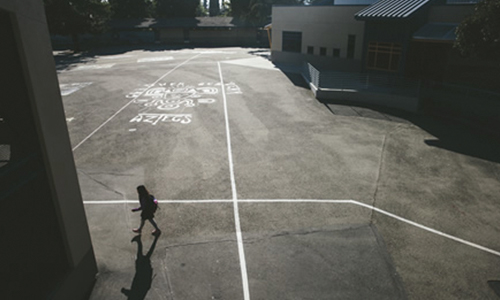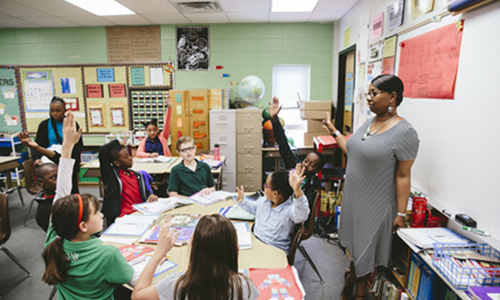Equity
It remains a critical challenge to ensure all children—regardless of race, ethnicity, gender, socio-economic status, and/or ability—have access to a high-quality education. We are at a pivotal time where communities and schools are navigating issues of equity, poverty, and opportunity gaps against a backdrop of shifting education policy. With access to exceptional data and a multi-disciplinary team of researchers and research partners, we are able to provide unique insight into these important issues.


Evaluating the relationships between poverty and school performance
This visualization presents findings from our report Evaluating the Relationships Between Poverty and School Performance and gives you the chance to explore how your school site compares to schools from the sample.
By: Andrew Hegedus
Topics: Equity, High-growth schools & practices


This kindergarten sneak preview helps families hit the ground running
For three weeks in the summer, children who are entering kindergarten in Portland, Oregon, get ready and get excited to start school. While it’s no substitute for pre-K, getting a preview helps ease the transition for kids, and offers parents a sense of connection. Special correspondent Lisa Stark of Education Week reports.
PBS News Hour
Mentions: Beth Tarasawa
Topics: Early learning, Equity, High-growth schools & practices


Three research-based culturally responsive teaching strategies
Strategies from the Multnomah County Partnership for Education Research can help strengthen student-teacher relationships and improve student achievement.
By: Beth Tarasawa
Topics: Empowering educators, Equity


New NWEA Research Explores the Relationships Between Poverty and School Performance
Learn what research shows about how the use of achievement data as the predominant metric for determining school success may perpetuate education inequity.
By: Andrew Hegedus
Topics: Equity, High-growth schools & practices


Positionality in teaching: Implications for advancing social justice
In order to ask students to be vulnerable in talking about how they have been exposed to, and impacted by, society’s messages about race, gender, and sexual identity, we have a responsibility to first demonstrate that vulnerability ourselves. Thus, our work is more about “being” than “doing.” Modeling honest self-assessment allows us to ask students to be reflective about their relationship to power, privilege, and oppression.
By: Angelica Paz Ortiz, Beth Tarasawa, Jack Straton, Noelle Al-Mustaifry, Anmarie Trimble
Topics: Equity


Rethinking summer slide: The more you gain, the more you lose
Megan Kuhfeld draws on data from the 3.4 million students who took the NWEA MAP Growth assessments to find that summer slide is common, but not inevitable. According to the data, the students who experienced the greatest loss were those who made the greatest gains during the previous school year.
By: Megan Kuhfeld


A matter of time: variations in high school course-taking by years-as-EL subgroup
This study improves upon previous research by addressing this dimension of heterogeneity and reporting detailed by-subject analyses.
By: Angela Johnson
Topics: Equity, English Language Learners


